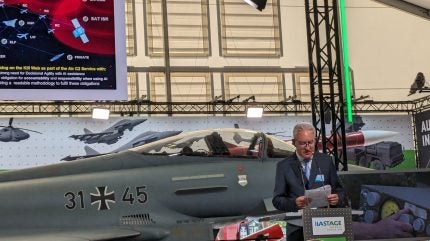
One week after Rohde & Schwarz revealed the “AI backbone” of Future Combat Air Systems (FCAS) project is operational, Airbus Military CEO Clive Schley gave an update to ILA Berlin on the progress being made on the European defence initiative.
Schley detailed some of the current assessments and analysis being undertaken internally at the pan-European aerospace giant, and announced an accelerated timeline for the system that was will not wait for the next generation of Eurofighter jets to come online in 2040.
“The multi-domain combat cloud will offer services and capabilities with artificial intelligence in every area of the mission: Air C2 situational awareness, threat assessment; ISR engagement [and] weapons delivery.
“Airbus is currently working internally on the identification of these capabilities and applications with AI assistance,” Schley outlined.
Although the full project remains a long-term ambition to create a multi-platform digital battle management system, integrating AI and drone technology, events of the past 24 months have given a new urgency to the modernisation of European air defence.
The outbreak of war in Ukraine and the crucial role of manned fighters and UAVs in that battle has given new impetus to developing AI nodes to NATO specifications “directly giving our Air Forces the tactical advantage.”

US Tariffs are shifting - will you react or anticipate?
Don’t let policy changes catch you off guard. Stay proactive with real-time data and expert analysis.
By GlobalData“This use of AI cannot wait until 2040 when the Next Generation fighter arrives. The war in Ukraine highlights to urgent need for Air Forces to engage increasing numbers of dynamic targets, requiring the ability to run multiple chains in parallel and close them as soon as possible,” Schley said.
Although Airbus did not reveal its roadmap to launching the next step in its FCAS journey, it did reveal a new approach to its development strategy.
“Airbus and more broadly the European [defence] industry are working on an incremental way to bring AI assistance in national FCAS alongside a system of systems approach – as soon as possible.”
AI pilots will outperform humans
Schley was followed by a panel discussion on the uses of AI in air wars.
Although the promise of fully-digital AI kill-chains could take the majority of humans out of direct fire confrontation, Colonel Tobias Wandel of the Kommando Luftwaffe remarked that advanced enemy cyberwarfare technology limited the potential of these systems.
“I think the idea that each and every moment you will have to reach back to a three-star general sitting in a bunker in the Florida Keys or wherever, it won’t work. You will need a human upfront so somebody can take the moral decision,” he said.

Brandon Tseng, co-founder of Shield AI, agreed in part with Wandel, that human moral decision makers will remain key.
“That is the role that I believe humans will play on the battlefield in the future. And that is why you’re going to want an F-35 pilot up in the air commanding swarms of CCAs, ACPs, you name it.”
But exactly where Tseng envisions those pilots being remains partially unclear, because he told ILA Berlin that F-16 testing in the US by Shield AI has found that quite simply: “An AI pilot can do nearly everything a human pilot can do, and will be better at it…. In dogfighting scenarios [the AI] wins 99.9% of our matches against human pilots”.
“I am 100% confident that AI pilots will outperform human pilots in… missions and operations,” the ex-Navy Seal said.
By Patrick Rhys Atack.



